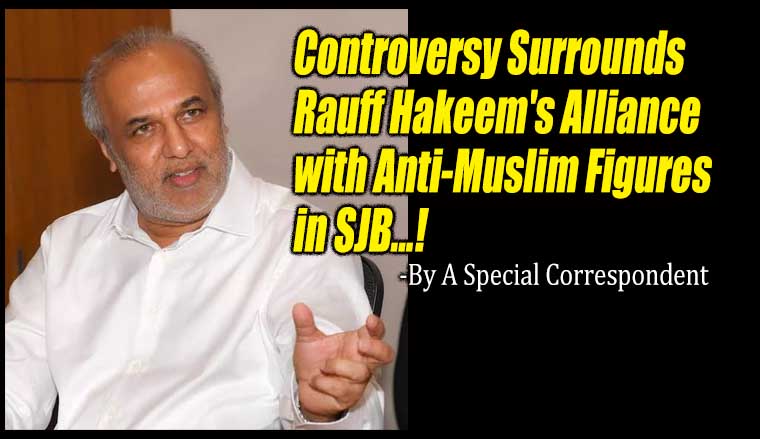-By A Special Correspondent

(Lanka-e-News -17.Feb.2024, 11.30 PM) In a move that has sparked intense debate within Sri Lanka's political sphere, Rauff Hakeem, leader of the Sri Lanka Muslim Congress (SLMC), finds himself entangled in controversy over his association with individuals known for their anti-Muslim sentiments within the Samagi Jana Balawegaya (SJB) political alliance.
Hakeem's decision to align himself with figures like Channa Jayasumana, a politician infamous for his anti-Muslim rhetoric and alleged involvement in instigating ethnic tensions, has raised serious questions about the integrity of the SJB coalition.
Critics argue that Hakeem's alliance with Jayasumana, who has been accused of deliberately fueling hatred towards the Muslim community, is not only morally questionable but also detrimental to the interests of Sri Lankan Muslims. They point to Jayasumana's role in perpetuating baseless conspiracy theories, such as the false accusations against Dr. Seigu Shihabdeen Mohammad Shafi, a respected gynecologist who was unjustly targeted and vilified.
The case of Dr. Shafi, who was falsely accused of performing sterilization procedures on Sinhala women without their consent, serves as a stark reminder of the dangers posed by individuals like Jayasumana. Despite being exonerated by investigations, Dr. Shafi endured immense suffering due to the spread of malicious propaganda.
Furthermore, critics argue that Hakeem's support for the SJB raises concerns about the party's commitment to representing the interests of minority communities, particularly in light of its inclusion of members with known anti-Muslim sentiments.
The broader context of systemic discrimination against Muslims in Sri Lanka, including forced cremations of COVID victims and desecration of religious sites, underscores the urgent need for political leaders like Hakeem to take a principled stand against bigotry and injustice.
Despite Hakeem's assertion that his alignment with the SJB is driven by a desire to protect the interests of Sri Lankan Muslims, many within the community remain skeptical. They argue that supporting a coalition that accommodates individuals hostile to Muslims is not only ethically wrong but also religiously prohibited under Sharia law.
As the debate rages on, it remains to be seen whether Hakeem will heed the calls to distance himself from figures like Jayasumana and reaffirm his commitment to championing the rights of Sri Lanka's Muslim population. Critics argue that Hakeem, as a representative of Sri Lankan Muslims, has a duty to prioritize their interests above political alliances. They point to the suffering endured by Muslims at the hands of individuals like Jayasumana, whose actions have led to widespread discrimination and persecution.
The case of Dr. Seigu Shihabdeen Mohammad Shafi serves as a poignant example of the consequences of such actions. Falsely accused and vilified by Jayasumana and others, Dr. Shafi endured immense hardship, including detention under the Prevention of Terrorism Act (PTA). Despite being exonerated, he continues to face challenges in clearing his name and seeking justice.
Furthermore, critics argue that Hakeem's support for the SJB raises questions about the party's commitment to representing the interests of minority communities. The inclusion of individuals with known anti-Muslim sentiments within the alliance undermines its credibility as a champion of equality and justice.
Amidst calls for Hakeem to demand the removal of figures like Jayasumana from the SJB, questions abound regarding his motivations for aligning with a party leader who appears to be swayed by anti-Muslim propaganda.
---------------------------
by (2024-02-17 20:04:41)
Leave a Reply